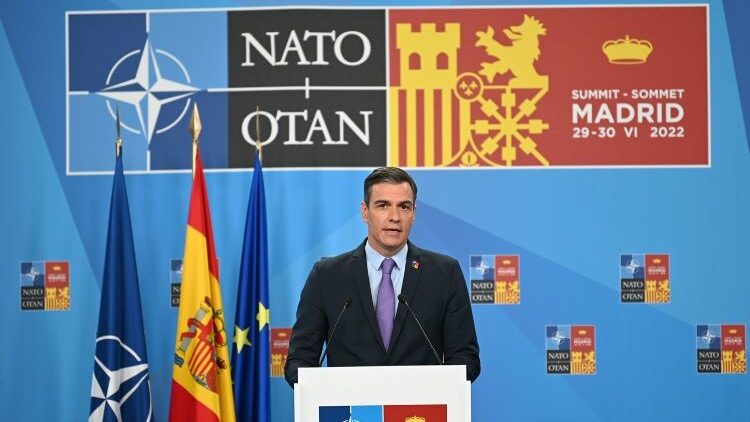The Diplomat
The President of the Government, Pedro Sánchez, announced yesterday, at the end of the NATO Summit in Madrid, his intention to put before the Spanish Parliament a “country agreement” to reach the 2% in Defense spending in 2029 (therefore, five years after the date of 2024 established in the NATO Summit of 2014). For the moment, it already has the support of the main opposition party, the PP, and the rejection of its government partner, Unidas Podemos.
“The Government is already working to increase defense investment this year and the proposal that I am going to present to the Parliament is to reach that 2% over a period of eight years, that is, until 2029,” said the head of the Executive at the press conference following the Summit, which was held on Wednesday and Thursday at the IFEMA fairgrounds in Madrid.
“I want this proposal to be a country agreement to defend and guarantee what has been put in question and at risk by Putin’s war in Ukraine, and that is the security of Europe and also to guarantee and reinforce the security of Spain,” he continued. For this reason, Sánchez expressed his wish that this agreement “transcends ideological issues” and that the situation in Ukraine “makes some political formations that previously had a different vision of NATO reflect”.
Current defense spending in Spain is 1.03% of GDP, which places our country in the penultimate place among the 30 NATO member states. Despite this, the percentage allocated by Spain in 2021 was the highest since 2014, when only 0.92% was dedicated to defense. Compared to 2020, the Defense budget in Spain increased by 6.94%, well above the 1.8% increase of the NATO total and even the 3.11% increase of the total of the European allies and Canada (in the United States, the increase was 1.23%).
Pedro Sánchez announced in mid-March the Executive’s intention to increase defense spending to 2% of GDP. The announcement, which took place a few days after the informal European Council of Versailles urged EU states to “substantially” increase defense spending in the face of the new security challenges arising from the Russian invasion of Ukraine, was opposed by UN Podemos and most of Sánchez’s parliamentary supporters. On March 30, the President insisted before the plenary session of the Congress of Deputies that Spain, as a “member of the European Union and also of NATO”, has the “duty” to “achieve in defense that 2% of our Gross Domestic Product over the next few years”.
The 2% target is part of the so-called Wales Commitment, approved at the 2014 NATO Summit and which urged states to “advance” towards 2% in a period of ten years (therefore, in 2024). Moncloa sources indicated last March, before the Alliance’s Extraordinary Summit in Brussels (where the increase in the defense budgets of the Member States was addressed), that it is very difficult for Spain to advance beyond 1.22% in 2024. In fact, although some countries have already reached this target, others have already announced that they will not achieve it before 2033. An example of this is, precisely, yesterday’s commitment by Sánchez to reach 2% in 2029, five years later than planned in Wales.
Support of the PP and rejection of Podemos
As has happened with the agreement between the Chief Executive and the President of the United States, Joe Biden, to increase from four to six the number of US destroyers at the Rota naval base (which must be approved by the Council of Ministers and subsequently endorsed by the Parliament, for which it will be presented “soon” before the Parliament, as announced yesterday by Pedro Sánchez), the Government has obtained the support of the PP for its plan to increase military spending and has met with the firm opposition of its coalition partner, Unidas Podemos.
The president of the PP, Alberto Núñez Feijóo, yesterday congratulated the Government for “the positive image that Spain has given” with the organization of the Summit and assured that his party will support the increase in the military budget. “It seems that, after the Summit, the Government needs the PP,” he declared. “We are where we have always been, we are supporters of NATO and of a relationship of friendship and trust with the US”, he assured. In the same sense, the secretary general, Cuca Gamarra, assured that the PP is willing to support both the increase in spending and the new deployment of the United States in Rota, but demanded – in declarations to Antena 3 – a “joint position of the whole Government” because “if there is no joint position of the whole Government, what is in question is the State position of the Government”.
In a very dilferent sense, the president of the confederal group of Unidas Podemos in Congress, Jaume Asens, assured the media yesterday, in the corridors of Congress, that his party will not support the budget increase in Defense. “You already know our position on this issue, we will not support it”, he reminded.
This was also yesterday the position of some members of the Government. The Minister of Consumer Affairs and federal coordinator of IU, Alberto Garzón, announced that “the ministers of Unidas Podemos will vote as our parliamentary group”. “We have to wait for the respective vote to come, but it is clear what the position is, yesterday I marked it in the hemicycle and we are going to keep it,” he added. Likewise, the Minister of Social Rights and leader of Podemos, Ione Belarra, stated that “the question that must be asked is: if more money is allocated to military investment, where does that money come from”. “We have always thought that Spain needs much more guaranteed income than investment in tanks or weapons, that Spain needs people to be attended in Primary Care in 24 or 48 hours, that people have a medical specialist, and we do not need more tanks and weapons”, continued Belarra, who warned that the only objective of the support offered by the PP is “to destabilize and break the Government”.
In fact, Unidas Podemos MPs yesterday voted against a motion tabled in the Plenary of Congress by the Popular Group to support the results of the NATO Summit and urge the government to guarantee adequate funding for national defence, “reaching 2% of GDP” by 2030. The Socialists did support these aspects of the motion.







